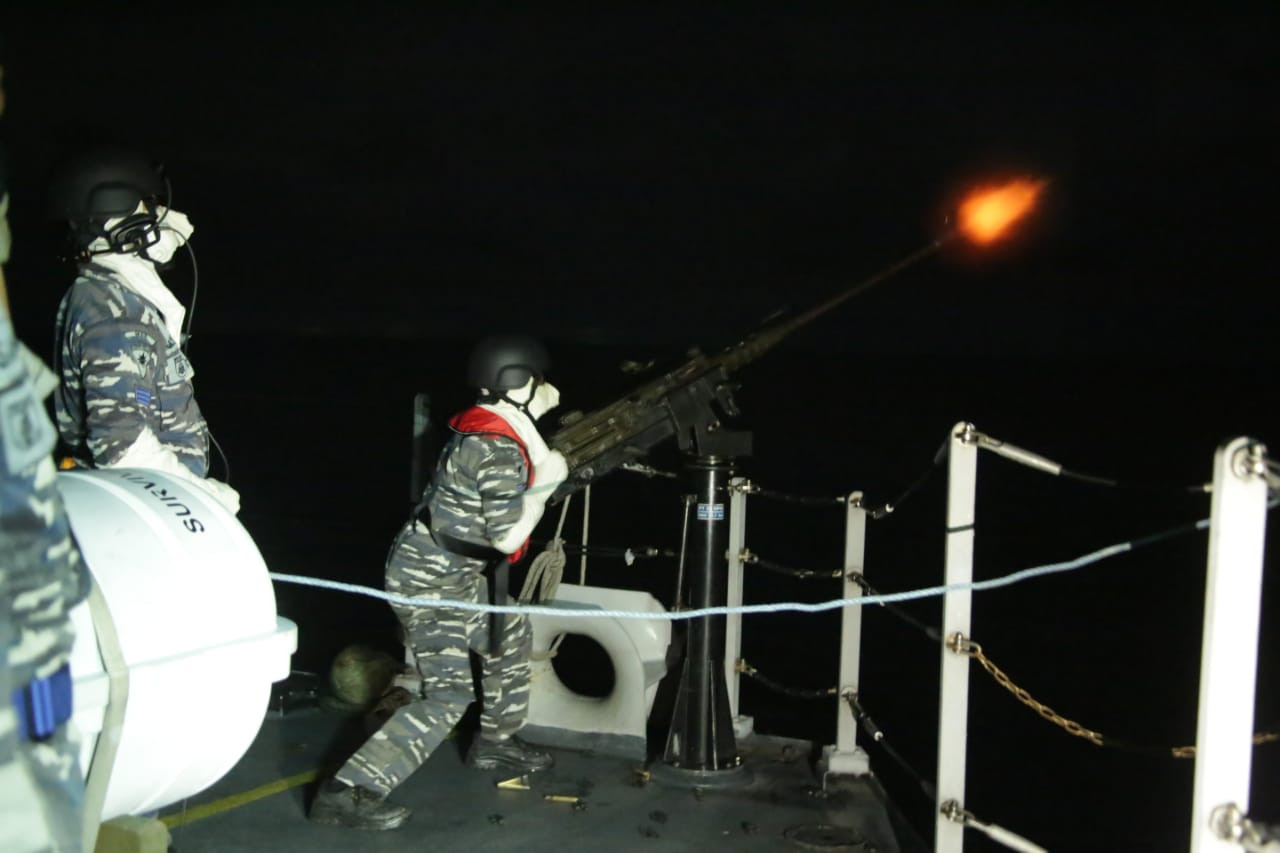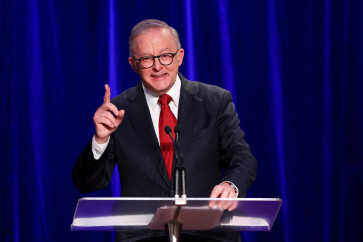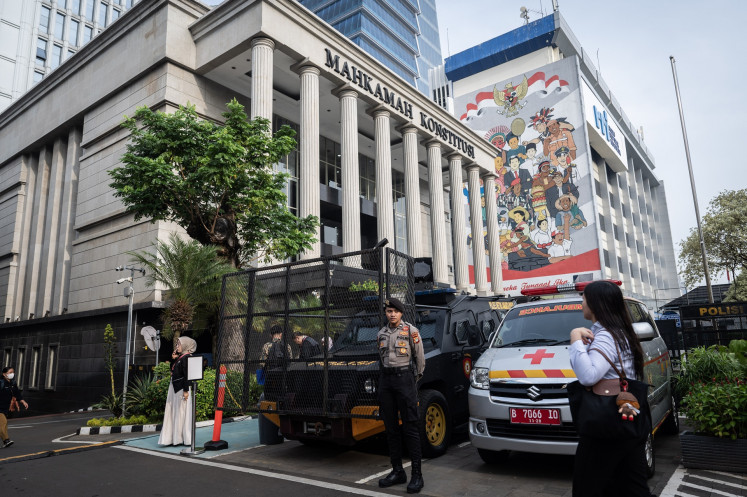Let Prabowo handle Natuna waters conflict
Prabowo will have to focus on the Natuna issue because Indonesia is now dealing with the Chinese military in the waters.
Change text size
Gift Premium Articles
to Anyone

P
resident Joko “Jokowi” Widodo needs to assign Defense Minister Prabowo Subianto to be in charge of resolving the problems in Natuna waters, amid escalating (albeit hidden) tension with China. The current situation there has gone beyond the realm of diplomacy, such that a new approach combining civil and military diplomacy is required.
Prabowo’s international standing and the possibility that he may be Indonesia’s next president will strengthen his bargaining power vis-à-vis China.
Perhaps there are fears Prabowo’s involvement may instead escalate the tension as China may perceive it as a direct military challenge from Indonesia. But as an intellectual military general with a global network especially with western countries, Prabowo’s role in the policy-making related to the Natuna issue will increase Indonesia’s political weight.
For Prabowo, this will be a good opportunity to boost his electability ahead of the 2024 presidential election. Conversely, failure would jeopardize his third attempt to win the presidency.
Foreign Minister Retno LP Marsudi remains in command when it comes to Indonesia’s foreign policy in general. Prabowo will have to focus on the Natuna issue because Indonesia is now dealing with the Chinese military in the waters. This does not mean Indonesia is ready for a confrontation with China, but is simply to make it clear the Natuna issue is sensitive for both the government and the nation and can reopen the “old wounds” of bilateral relations between Jakarta and Beijing.
As a retired Army general, Prabowo holds a more pragmatic and realistic view about the increasingly heavy presence of foreign military in the Indo-Pacific area than the Foreign Ministry, which tends to pursue traditional diplomacy.
When asked about the AUKUS agreement between Australia, the United Kingdom and the United States, during an international forum in Manama on Nov. 22, for example, Prabowo bluntly said he could understand and respect the three countries’ move. Diplomatically, Indonesia has expressed concern over the strategic military alliance that clearly is targeting China.
"Officially our position is that of course Southeast Asia should remain nuclear free, and the fear of course among Southeast Asian nations is that this will spark an arms race," he said.
"But as I said the emphasis of every country is to protect their national interest. If they feel threatened […] they will do whatever they can to protect themselves," said Prabowo.
The government is always extra cautious in dealing with China, not just because the world’s second-most-powerful economy is Indonesia’s most important trading partner and most important source of COVID-19 vaccines, but also because the issue is too delicate for people at the grassroots level to grasp.
Historically, Indonesia has been hostile toward China. Following the failed coup in 1965, the government dissolved the Indonesian Communist Party and cut its diplomatic relations with Beijing, accusing China of masterminding the coup attempt. China strongly denied the allegation.
Then-president Soeharto agreed to reopen diplomatic ties 25 years later after receiving an official assurance that Beijing would not interfere with Jakarta’s domestic affairs and that it acknowledged Indonesia’s territorial integrity.
Then-Chinese premier Li Peng came to Jakarta to attend the official resumption of relations on Aug. 8, 1990 and together with Soeharto witnessed the signing of the official diplomatic document by Indonesian foreign minister Ali Alatas and his Chinese counterpart Qian Qichen.
Now, Indonesia and China are on the brink of open conflict in Natuna waters, where a Russian company-led consortium is drilling for oil and gas after securing a permit from Indonesia. China has reportedly demanded that Indonesia stop the drilling activities and its Navy ships have regularly turned up in provocative acts. Moreover, Indonesian authorities have frequently expelled Chinese fishermen being escorted by China’s coast guard.
The oil and gas drilling is being carried out at Indonesia’s 200-nautical mile exclusive economic zone (EEZ), which is recognized as Indonesia’s sovereign right under the 1982 United Nations Convention on the Law of the Sea (UNCLOS). China has unilaterally claimed to own the seas based on its nine-dash line map and insisted that its fishermen have been fishing there for centuries. The Hague-based Permanent Court of Arbitration turned down all China’s claims on July 12, 2016.
In response to the tension, House of Representatives Speaker Puan Maharani recently demanded the government openly talk to the people.
“The government must take into account the public’s concerns. When there is an official letter from China, then explain it. However, when there is a letter of protest from China, the government must take a stand because this is a matter of our sovereignty,” Puan said.
Reuters recently reported earlier this month that “One letter from Chinese diplomats to Indonesia's foreign ministry clearly told Indonesia to halt drilling at a temporary offshore rig because it was taking place in Chinese territory”.
A senior Indonesian diplomat told me that Indonesia intentionally refrained from openly reacting to China’s growing assertiveness on the Natuna waters for several reasons, including the sensitivity of the China issue among the Indonesian public. Indonesia has witnessed numerous racial conflicts targeting those of Chinese descent.
“We are still waiting for the completion of the oil and gas drilling in the Natuna waters,” the official said.
Former maritime affairs and fisheries minister Susi Pudjiastuti became a source of national pride with her “ridiculous” but brave policy of burning and sinking foreign fishing vessels caught poaching in Indonesian waters, including Natuna waters. Several ministers scolded her for the adventurous acts, but the public highly appreciated Susi, who returned to fishery business after completing her term in 2019.
Prabowo's involvement in managing the Natuna waters could be instrumental in Indonesia’s attempt to settle the matter with China amicably. No doubt Indonesia is united in defending its sovereign rights in Natuna waters.
***
The writer is senior editor at The Jakarta Post.









